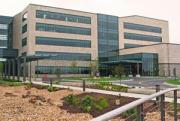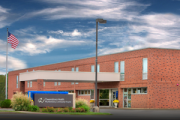Speech Therapy
Communication is the cornerstone of relationships. After all, it’s how you express your thoughts, feelings and beliefs. So naturally, it’s frustrating when you can’t use the words and sounds you need to connect with, talk with and understand each other, or when you have trouble processing what others are saying.
Speech therapy can help address these types of challenges. A speech-language pathologist is a specially trained professional who will work closely with you to improve speech skills, language needs, verbal processing challenges and even swallowing difficulties.
At Owensboro Health, our team works with people of all ages – from children struggling with pronouncing specific sounds to older adults recovering from stroke.
What to Expect at Speech Therapy
The first step in speech therapy is to get a clear understanding of your challenges and goals. One of our speech-language therapists will evaluate your speech, communication, understanding or swallowing abilities. We’ll also work closely with your referring provider to get a clear picture of your overall health and wellness. You may also need an audiological evaluation (hearing test) to identify any potential hearing issues.
Once we have all the information we need, we’ll work with you to create a therapy plan, which may include several sessions of speech therapy. During each session, we’ll work to achieve mini-milestones marked in your treatment plan, using developmentally appropriate tools, like games for children or exercises and drills for older individuals.
Most importantly, your speech therapy is built around you — designed to help you overcome any challenges, build your confidence and give you the tools you need to connect with others.
Speech therapy is also often used to help strengthen muscles that control speech and swallowing; muscles that can sometimes be damaged after a stroke or as a complication from a neurological condition like multiple sclerosis or Parkinson’s disease.
Speech Therapy Services
Speech therapy can help with many conditions and challenges, including:
- Aphasia. Difficulty reading, speaking, writing and understanding language.
- Apraxia. Trouble forming the words you want to say.
- Articulation disorders. Difficulty pronouncing certain sounds (e.g., a child who says “th” sound instead of “s” sound).
- Cognitive-communication disorders. Difficulty communicating from damage to the brain.
- Dysphasia. Trouble swallowing, often as the result of a stroke or neurological condition like Parkinson’s disease.
- Dysarthria. Slow or slurred speech caused by weakened or damaged muscles from stroke or neurological condition.
- Expressive delays. Trouble expressing thoughts or speaking, which can be caused by injury, stroke or developmental disability.
- Fluency disorders. Problem with the speed, flow and rhythm of speech (including stuttering).
- Receptive disorders. Difficulty understanding or processing information someone else is saying.
- Resonance disorders. Conditions that affect oral or nasal passageways can block airflow and change the vibrations that create sound (e.g., cleft palate, swollen tonsils).
Exceptional, Compassionate Care
Here, you’ll find experienced and understanding care. Our team of speech-language pathologists (SLP) is eager to put their knowledge and training to work for you. Each SLP has a master’s degree in speech-language pathology and has earned the Certification of Clinical Competence from the American Speech-Language-Hearing Association (ASHA). In addition, they are all licensed by the Kentucky Board of Speech-Language Pathology and Audiology.





